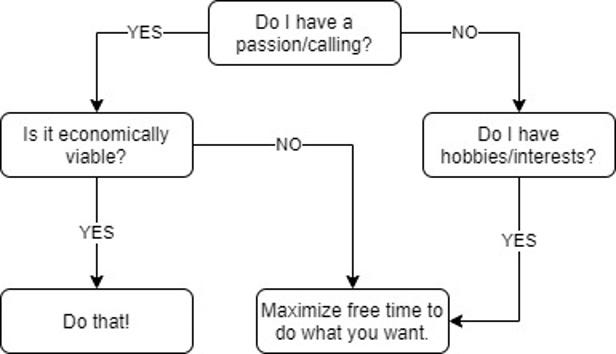A simple flowchart for your life plan...
From the Happiness PhD Project with Jackson Kerchis
What should I do with my life?
Good question.
Let’s address the typical approaches to this question (most to least common).
1) Don’t think about it.
2) Make money and be successful.
3) “Love what you do and you’ll never work a day in your life.”
#1 is obviously no good.
Yet most people don’t seem to put much intention into shaping their life. Someone asks what you’re going to do and you say “I’m gonna go to school (or back to school) and get a good job.” That’s a lot like saying “something good,” when a server asks you for your lunch order.
Does it make sense to answer one of life’s most important questions in a way that wouldn’t fly at the local diner?
Life is more complicated than lunch — an exact response may not be possible. But a thoughtful set of parameters usually is possible. At least that gets you in the right direction. As Hunter S. Thompson put it: “Beware of looking for goals: look for a way of life. Decide how you want to live and then see what you can do to make a living within that way of life.”
So we’re in agreement that simply not addressing the “what should I do with my life” question is not the way. That takes us to #2.
#2 — I could fill a book full of quotes and examples of people who learned that “making it” — getting rich and getting to the top of the heap — isn’t the answer. I’m not going to do that. It’d be terrible to read (and write).
“I think everybody should get rich and famous and do everything they ever dreamed of so they can see that it's not the answer.” – Jim Carrey
Robin Williams
Elvis Presley
Marilyn Monroe
A few bullet points are enough.
Kahneman and Deaton (reference) were amongst the first to thoroughly investigate the income-happiness relation. They found that income and happiness are correlated until about $112,000 in household income (today’s dollars). Then the relation levels off.
So it’s not that financial success is a bad thing. In fact other data from Killingsworth (reference) suggests that if you keep doubling your income (increasing exponentially) it may lead to small gains in happiness.
The point is you quickly hit diminishing returns. An extra $20,000 would be great for me but for Jeff Bezos he wouldn’t even notice.
Further psychology research paints a similar picture when we look at what personal values lead to happier lives (there’s a lot). A money/success/extrinsic focus usually predicts lower happiness.
So we see that while success is great — ultimately it’s not the answer.
So this takes us to option 3: some iteration of “do what you want and you’ll never work a day in your life”.
#3 is a great thought but not all of us can be artists, astronauts, or athletes. In a world of 8 billion people, finding something we just love to do is not realistic for all of us.
If you’re blessed with a calling that can be a livable career that’s great — go after it! This is not meant to discourage anyone. It is, however, a note of caution. Not all of us stumble upon a passion that is viable as our life’s work.
I for one enjoy mixed martial arts and walking in the countryside. I’m also slow, weak, and have relatively small hands (bad for punching). I’m not going to make it with a career as a UFC fighter. And wandering the countryside offers a low starting salary.
For many of us, doing what you love so you never have to work a day in your life just isn’t realistic.
So how do we answer – “what should I do with my life?” This is the best I can do…
If you have an economically viable passion — just start.
If you don’t then embrace a career that maximizes your free time to do what you want. Don’t think “how much money can I make?”. Think “what is the least amount of work I can do to get the amount of money I want?”.
One of my favorite career stories is a healthcare consultant who, every time he was do for a raise, just asked for the same percent reduced hours (e.g. instead of a 10% raise how about 10% fewer hours). He now makes a good chunk of coin working remote like 3-4 hours per day on internal projects.
Another example is a friend of a friend who loves to write poetry. So he works as a corporate lawyer part time and spends 20 hours per week writing poems for fun.
This flowchart may help you…
Your happiness nerd,
Jackson K.



